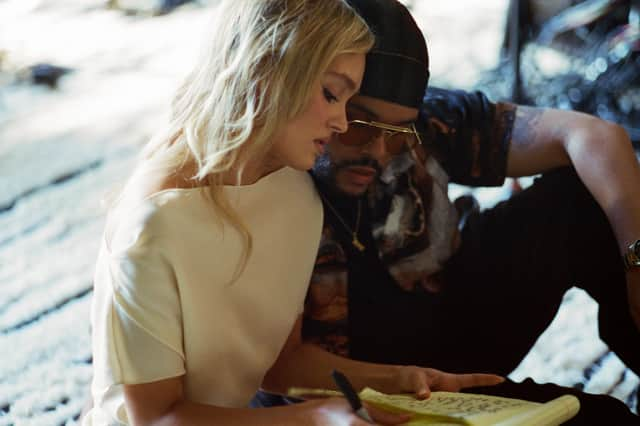The Idol post-mortem review: Sam Levinson and Abel Tesfaye’s sleazy drama couldn’t rise above its hollow core
and live on Freeview channel 276
Over the past week or so, a rumour took hold: had The Idol been cancelled prematurely? The series was, it turned out, coming to a close after five episodes rather than the previously announced six, leaving a full hour of television seemingly unaccounted for. It’d be unusual but not unprecedented, with it once having been essentially standard practice not to broadcast any leftover episodes of shows cancelled in the middle of their run; now, at a point when it’s apparently the new normal to simply remove a show entirely from a streaming service to save pocket change on hosting fees and residual payments, the idea that an expensive, embarrassing failure like The Idol might simply stop rather than be allowed to end seemed easily conceivable.
The truth, as with most things linked to The Idol, was anticlimactic. During the well-documented behind-the-scenes overhaul that saw Euphoria’s Sam Levinson take the reins from original showrunner Amy Seimetz, the subsequent rewrites and reshoots saw that sixth episode culled entirely, with Levinson and (co-creator, executive producer, and “actor”) Abel Tesfaye deciding that the story could be told just as well in one episode fewer. (The ballooning costs for the reshoots and the tight production timeline dictated by Tesfaye’s tour schedule were presumably also an issue, but still.) When The Idol premiered at the end of May, it had been a five-part drama for longer than it’d been a six – but, as the initial controversy gave way to widespread disinterest, no one really noticed until a few days before it all wound down anyway.
Advertisement
Hide AdAdvertisement
Hide AdEven knowing all of that, though, it’s difficult not to feel the absence of that elusive sixth episode when watching The Idol’s series (or season?) finale, ‘Jocelyn Forever’. In reality, of course, it wouldn’t literally be the case that an hour was simply excised from the transmission order; scenes would be cut from the script, maybe a location fell through, perhaps a character was written out, and presumably gradually it’d make more sense to arrange the various puzzle pieces into a different shape to what was intended originally. Still, it feels like The Idol was truncated – if not hacked apart – in how it pushes key scenes offscreen entirely, opening its final episode with the parasitic Tedros (Tesfaye) at his lowest point and Jocelyn (Lily-Rose Depp) in a rare position of control. The spell has finally broken, leaving Tedros powerless, but it blunts the impact of the reveal – as well as the arc of the show as a whole – to just let that float in the ether after the credits roll on one episode and the titles start on the next.


In a way, that phantom episode feels like a solid metaphor for The Idol as a whole anyway: there’s just something missing. It’s long been clear that The Idol would have to contend with an absence – from the charisma-less void that is Tesfaye’s performance to the sheer simple lack of anything to say – but it’s become increasingly obvious week on week how hollow the whole affair has been. Its grand ideas are, at best, tired cliches about how pain is a crucible, that the best art is borne out of trauma; there’s never been any attempt to develop beyond that, though, to interrogate what that might mean, to either deconstruct it or validate it. That’s not just superficial, though, but cynical, and the way The Idol dwells on traumas with nothing to say about them quickly left it feeling ugly and sleazy.
“It’s not about you. It’s actually about me,” says Jocelyn at one point during the finale, rebuking Tedros and pushing him further into a depressive spiral. It’s a late-stage (re)affirmation of the ostensible mission statement for the show, albeit an unconvincing one. In a final episode that sees Jocelyn repositioned as a master manipulator in her own right, rather than a vulnerable young woman overwhelmed by grief, it’s difficult to feel much coherence – or even basic continuity – between this version of Jocelyn and the one we’ve seen previously. Lily-Rose Depp was always the strongest part of the show, if admittedly only by default, but it’s a performance easily overlooked given the general mess around her. A version of The Idol that was actually about Jocelyn would’ve been a better show – but it wouldn’t have been this show. In the end, that’s what The Idol comes down to, the critical equivalent of a shrug: it would’ve been better if it were just a completely different show.
The Idol is available to watch on Sky Atlantic and NOW TV. You can find more of our coverage of The Idol here, and read our review of the first episode, Pop Tarts and Rat Tails, here.
Don’t forget to subscribe to our weekly television newsletter, listen to our Screen Babble podcast, and follow us on twitter @NationalWorldTV. You can also find me @morelandwriter.
Comment Guidelines
National World encourages reader discussion on our stories. User feedback, insights and back-and-forth exchanges add a rich layer of context to reporting. Please review our Community Guidelines before commenting.
